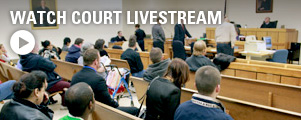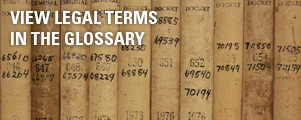The Archiving Issue, resolved
Today we are launching public access to the video archives of our court live-streams.
It’s been a long road here.
Over a month ago, right after the May 2 launch of OpenCourt, we voluntarily closed public access because of remaining concerns of the Norfolk County District Attorney Michael Morrissey.
While the guiding principles behind OpenCourt are that justice is to be administered in public and that the role of a news organization is to facilitate court openness, we wanted to respect his concerns.
In the last five weeks we conducted three OpenCourt advisory board meetings and two “access to archive” subcommittee meetings on this issue. This was a continuation of the process OpenCourt used in the months leading up to the project launch.
After discussing the issue and listening to the suggestions of the group, and wanting to both protect privacy concerns and press rights, here is the solution that we at OpenCourt and WBUR came up with:
- We will delay the availability of the archived material for two business days to allow for the redaction of specific problematic items e.g. the “blurting” of a minor victim’s name. If we deem any portion of the recording inappropriate, we will redact it, using the same professional standards that WBUR does. There will also be a process by which defense attorneys, the D.A.’s office or other involved parties may come to OpenCourt to ask for a redaction.
- Access to the archive will require free registration with the website and affirmative acceptance of the Terms of Use.
- The archive will remain free to all registered users.
- Involved parties will continue to be able to request redaction even after a day’s recording is made public.
What happens if there’s a “blurt”
We realized in the course of our discussions that while we have detailed guidelines for what can be live-streamed, we also need a clear process for dealing with redactions after the fact.
As mentioned above, we will use the same professional standards that WBUR does to determine what information is appropriate to make public.
Additionally, the Digital Media Law Project at the Berkman Center for Internet & Society assisted OpenCourt to create a framework that allows any interested parties (including attorneys on either side, defendants, victim advocates, or other affected individuals) to request redaction from us.
The parties must notify WBUR as to all of the following:
- The nature of the information requested to be redacted.
- The proceeding in which the information was disclosed.
- The reasons why that particular information needs to be redacted.
- The minimum amount of the recording that needs to be redacted to resolve those specific issues.
If WBUR agrees with the reasons stated for redaction and determines that the public benefit of release of the information is outweighed by the potential harm, then we will edit the recording to reflect that.
You can read the full text of the framework here.
So sign up and start perusing the archive!
Please step away from the mic
Stakeholders at our meetings were also concerned that both the defendants and the attorneys were not fully aware that the courtroom was being live-streamed. (This despite our many signs to that effect on the door, on the dock and in the aisle and the many informational meetings we held.)
This lack of awareness is something we’ve been noticing as well. Defense attorneys especially have been lax about having confidential conversations with their clients over the dock mic and near the standing mic. Being aware isn’t just for the sake of our project; the mics we are using feed the public record too.
So we have made the words on our signs fewer and larger, and have been reminding attorneys to be careful around the mics.
Hopefully that’ll do it.












I am happy to hear the archiving issue is resolved. OpenCourt is a great experiment, and I hope that it proves successful despite the challenges it faces.
I am disappointed by the Website “Terms Of Use”, which clearly were crafted by an overeager lawyer. They are impenetrable to the average person (whom I thought was the target audience of this site?) and asking everybody to read them and agree to them is both unreasonable and unrealistic.
Example: I agree that “I will maintain the accuracy and completeness of this information on a prompt, timely basis” in perpetuity? Why should I ensure that you have a permanent record of my identity just to access *potentially redacted* archives of *public* proceedings?
I could continue to pick it apart, but the real solution is to throw it out and start simpler. Your privacy policy is similarly huge and impenetrable.
I am glad to see you are licensing all submitted content as CC Attribution-Noncommercial-Share-Alike. Please try and keep your site license either non-existent, or as simple to read as those licenses.
It would be nice if the archives listed what items were being withheld.
So we don’t spend all day searching for something that has been removed.
It is great that the archives are available and the issues have been resolved.
It is a bit odd that on the day restraining orders were streamed a couple of things happened.
First, just as they started the RO hearing the camera was adjusted so that viewing of the plaintiff was clear to the public, something I thought they were trying to avoid.
Second, the hearing is as most RO hearings go, no legal basis for the RO is every stated for either of the RO’s. In the case of the first RO, the judge makes it clear he is relying only on the Affadavit, there is no testimony.
In the second RO, it is very clear that the judge is not following the law. No basis is made for the RO, the judge acknowledges that there is a case in front of Probate, yet chooses to make a decision that affects the children, big no no. As an excuse for his behavior he claims that since the mother already obtained sole physical and sole legal, he could issue the RO on the children.
This is why we need ALL RO’s streamed, to encourage these judges to show respect for the court by FOLLOWING THE LAW.